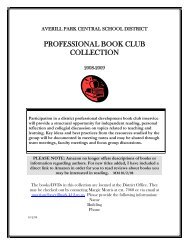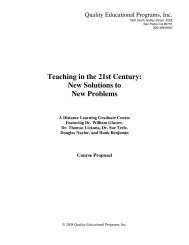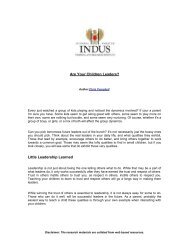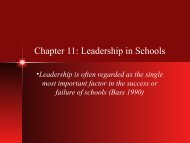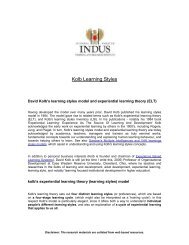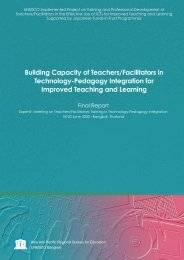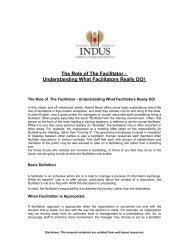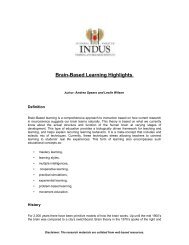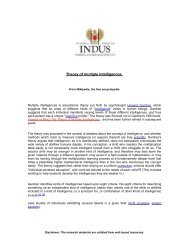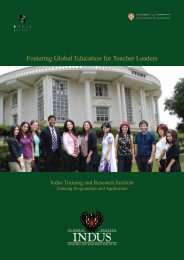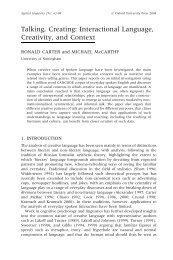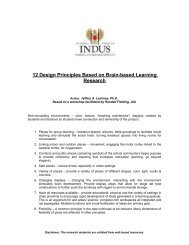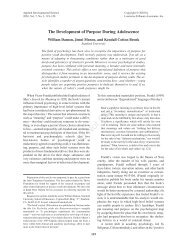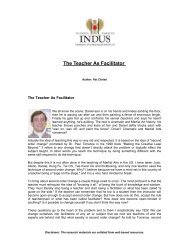Primary Years Programme Making the PYP happen - ITARI
Primary Years Programme Making the PYP happen - ITARI
Primary Years Programme Making the PYP happen - ITARI
- No tags were found...
You also want an ePaper? Increase the reach of your titles
YUMPU automatically turns print PDFs into web optimized ePapers that Google loves.
<strong>Making</strong> <strong>the</strong> <strong>PYP</strong> <strong>happen</strong><br />
<strong>PYP</strong> practices<br />
Planning<br />
Teaching<br />
Assessment<br />
Decreased emphasis on:<br />
Increased emphasis on:<br />
Decreased emphasis on:<br />
Increased emphasis on:<br />
Decreased emphasis on:<br />
Increased emphasis on:<br />
planning in isolation from o<strong>the</strong>r<br />
teachers<br />
planning collaboratively using an<br />
agreed, flexible system<br />
over-reliance on a limited set of<br />
teaching strategies<br />
using a range and balance of teaching<br />
strategies<br />
viewing planning, teaching and<br />
assessing as isolated processes<br />
viewing planning, teaching and<br />
assessing as interconnected<br />
processes<br />
planning disconnected from <strong>the</strong><br />
curriculum<br />
planning based on agreed student<br />
learning outcomes and in <strong>the</strong> school<br />
context of a coherent school-wide<br />
programme<br />
over-reliance on one grouping<br />
strategy<br />
grouping and regrouping students for<br />
a variety of learning situations<br />
over-reliance on one assessment<br />
strategy<br />
using a range and balance of<br />
assessment strategies<br />
<strong>the</strong> teacher making all <strong>the</strong> key<br />
decisions<br />
involving students in planning for<br />
<strong>the</strong>ir own learning and assessment<br />
viewing <strong>the</strong> teacher as <strong>the</strong> sole<br />
authority<br />
viewing students as thinkers with<br />
emerging <strong>the</strong>ories of <strong>the</strong> world<br />
viewing assessment as <strong>the</strong> sole<br />
prerogative of <strong>the</strong> teacher<br />
involving students in peer- and<br />
self-assessment<br />
planning which ignores students’<br />
prior knowledge and experience<br />
planning which builds upon<br />
students’ prior knowledge and<br />
experience<br />
focusing on what students do not<br />
know<br />
building on what students know<br />
over-reliance on one strategy of<br />
recording and reporting<br />
using a range and balance of<br />
recording and reporting strategies<br />
planning a large number of units,<br />
which will be covered superficially<br />
planning fewer units, to be explored<br />
in depth<br />
over-reliance on one teaching<br />
resource from one culture<br />
using multiple resources representing<br />
multiple perspectives<br />
seeking student responses solely to<br />
identify <strong>the</strong> right answer<br />
seeking student responses in order<br />
to understand <strong>the</strong>ir current<br />
conceptions<br />
addressing assessment issues at <strong>the</strong><br />
conclusion of <strong>the</strong> planning process<br />
addressing assessment issues<br />
throughout <strong>the</strong> planning process<br />
teaching about responsibility and<br />
<strong>the</strong> need for action by o<strong>the</strong>rs<br />
empowering students to feel<br />
responsible and to take action<br />
concluding each unit only by<br />
summative testing<br />
involving <strong>the</strong> students in shared<br />
reflection at <strong>the</strong> end of each unit<br />
planning which presents <strong>the</strong><br />
curriculum as separate, isolated<br />
disciplines<br />
planning which emphasizes <strong>the</strong><br />
connections between and among<br />
disciplines<br />
viewing students as passive<br />
recipients<br />
involving students actively in <strong>the</strong>ir<br />
own learning<br />
assessing for <strong>the</strong> sole purpose of<br />
assigning grades<br />
enabling students to see assessment<br />
as a means of describing learning<br />
planning which assumes a single<br />
level of language competency<br />
planning which recognizes a variety<br />
of levels of language competency<br />
a teacher-directed focus on rigid<br />
objectives<br />
pursuing open-ended inquiry and<br />
real-life investigations<br />
embarking on new learning before<br />
assessing <strong>the</strong> levels of students’<br />
current knowledge and experience<br />
assessing <strong>the</strong> levels of students’<br />
current knowledge and experience<br />
before embarking on new learning<br />
planning which assumes a single<br />
level of ability<br />
planning which recognizes a range<br />
of ability levels<br />
employing teaching strategies<br />
suitable only for first language<br />
learners<br />
maintaining constant awareness of<br />
<strong>the</strong> needs of second language<br />
learners<br />
evaluating units in isolation from<br />
o<strong>the</strong>r teachers<br />
evaluating collaboratively using an<br />
agreed, flexible system<br />
planning units which focus on one<br />
culture/place<br />
planning units which explore<br />
similarities and differences between<br />
cultures/places<br />
employing teaching strategies<br />
suitable for one level and type of<br />
ability<br />
addressing <strong>the</strong> needs of students with<br />
different levels and types of ability<br />
planning units which are token to<br />
minorities and have internationalism<br />
tacked on<br />
planning units which explore broad<br />
human experiences from a range of<br />
perspectives<br />
planning units in which exploration of<br />
major issues is incidental<br />
planning units which focus directly<br />
on major issues<br />
Figure 25 <strong>PYP</strong> practices<br />
© IBO 2000 73



